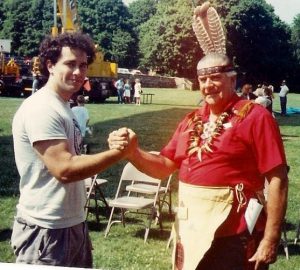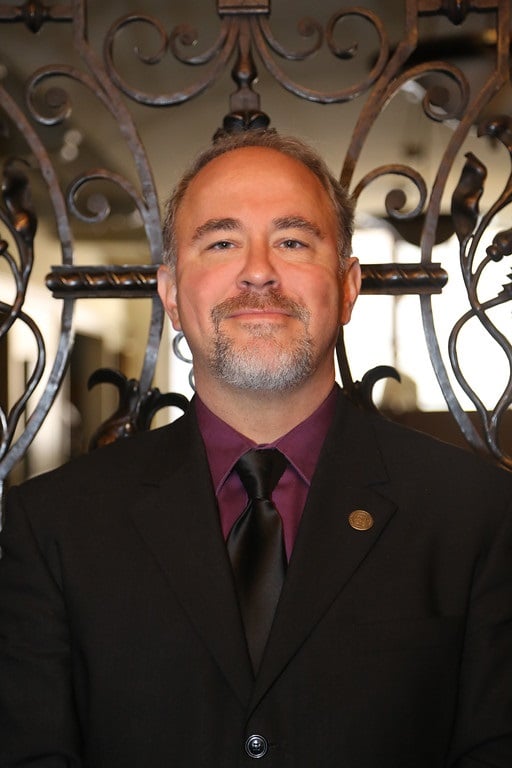[Editor's note: This is the second part of a two-part series of interviews with David Allen Lambert; the first part may be read here. The present article originally appeared in the Society's NEXUS newsletter, 4: 3.]
 Question: When did you first become interested in family history?
Question: When did you first become interested in family history?
Answer: Since the age of 12 I have belonged to the Stoughton Historical Society.
Q: That is a young age to begin. You were probably the youngest member.
A: I was. I started in 1981, and in 1984 they made me the assistant curator, when I was just 15.
Q: Did you learn archival and curatorial skills while you were there?
A: Yes, I’ve learned from a well-known printer in town. We worked together in the archives at the Stoughton Historical Society.
Q: What do you think led you at such a young age to become interested in history?
A: There is a story behind that. It sort of happened by accident. I was home one day with my grandmother and my uncle had come over and brought a book with him. I was looking through it and a picture flew out of it. My grandmother said, “That’s my father.” She said he passed away in 1921 and is written up in a book, A Memoir of John Poore, 1615-1818, by Alfred Poore (1881).
Q: That was your great-grandfather. You said that was a tintype?
A: Yes, like a photograph only instead of being exposed on paper, it was exposed on tin. It was a tintype of my grandmother’s father, my great-grandfather, Alexander Livingston Poor.
Q: Who was Alexander Livingston Poor? Was he a genealogist?
A: No, he was a paperhanger, born right across from the Boston Common. He was the son of Alexander Livingston Poor and Ann Whitney Phagins. His father was born in Newburyport, of English descent, of a family that came over in the 1630s; his mother was from Westbrook, Maine, of Scottish-English descent. They moved to Roxbury about May 30, 1874.
Q: What have you learned about your heritage?
A: I’d say it is predominantly English. Most of the people in my family came to Massachusetts between 1625 and about 1670. Also, I have more recent English background. My grandfather, my mother’s father, was born in … Cheshire, England. He came to Canada at the age of six in 1907. My last name is Lambert. My father’s father was born at St. Pierre et Miquelon, which is a small French island between Nova Scotia and Newfoundland, still owned by France. He was born there in 1887. I never knew my dad’s father.
Q: Do you plan to become a professional genealogist?
A: I plan to study library archival science in college. I would like to work at the National Archives, become a private investigator, or go into genealogy.
Q: What are some of the challenges that make family history interesting?
A: I like challenges because they give me something to strive for. For instance, you might find seven references in an index to persons of the same name, all born in 1792. You might have to examine each one, and then use other evidence to narrow it down to your ancestor. When I find information in addition to birth, marriage, death, place, and name, that is when it gets interesting. It might be that the person lived to an old age, went to church, walked 70 miles a day, or had a farm. In court records you find things like so and so loaned his cow to Edgar Snow, or something of that nature.
One case in my family has been a mystery. My great-grandfather’s father, Alexander Livingston Poor (II), died in 1884, and on his death certificate it says place of death, Charles River, cause of death, drowning. He was 72 years old. In a death notice in the Poor family records, I read, “Alexander L. Poor lived three score and ten years. He had no more desire to live in this world of trials after losing his brother Micajah and his beloved sister Mary Ann.” In other words, he was depressed about living. I think it may have been suicide.
Q: So, you are interested in the stories behind the vital statistics?
A: The vital statistics are the important part, but I look at genealogy this way: it is like drawing a picture. You could draw a pose of somebody with a stick figure, but when you add more detail it gets more interesting. If you have somebody named Joe Smith, born 1815, died 1902, so what? Joe Smith, born 5 August 1815 in Bristol, New Hampshire, a famer and greatly loved by all his fellow men – that man gets interesting.
Q: Why do you think genealogy is important?
A: Because you are your ancestors, in a way, and that’s your way of remembering them. People ask me, “Why are you interested in your ancestors, you’re so young.” Most kids were out there climbing trees, I was trying to get mine down on paper! I think someone who has done this before has drawn me to do this, because no seven-year-old is interested in genealogy.
Share this:

About David Allen Lambert
David Lambert has been on the staff of NEHGS since 1993 and is the organization’s Chief Genealogist. David is an internationally recognized speaker on the topics of genealogy and history. His genealogical expertise includes New England and Atlantic Canadian records of the 17th through 21st century; military records; DNA research; and Native American and African American genealogical research in New England. Lambert has published many articles in the New England Historical and Genealogical Register, the New Hampshire Genealogical Record, Rhode Island Roots, The Mayflower Descendant, and American Ancestors magazine. He has also published A Guide to Massachusetts Cemeteries (NEHGS, 2009). David is an elected Fellow of the Massachusetts Historical Society in Boston, Mass., and a life member of the New Hampshire Society of the Cincinnati. He is also the tribal genealogist for the Massachuset-Punkapoag Indians of Massachusetts.View all posts by David Allen Lambert →